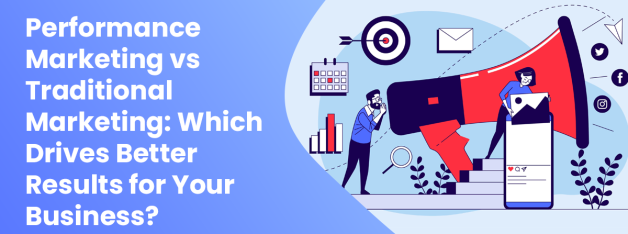Performance Marketing vs. Traditional Marketing: Which Performs Better for Your Business?

In today’s fast-evolving digital landscape, businesses are constantly deciding between performance marketing and traditional marketing to promote their products or services. While both approaches aim to attract a target audience and boost brand awareness, they differ in execution, measurability, and cost-effectiveness.
So, which one gives better outcomes? In this blog, we’ll break down the key differences, pros and cons, and practical applications of both marketing models to help you decide which digital marketing strategy is the best fit for your business.
What is Traditional Marketing?
Traditional marketing is a set of conventional advertisement techniques used long before the arrival of digital marketing. These are as follows:
- Print Ads (newspapers, magazines, brochures)
- Television and Radio Commercials
- Billboards & Outdoor Advertising
- Direct Mail Campaigns
Traditional marketing is more of brand awareness and reaching the maximum possible number of people rather than immediate and measurable results.
Benefits of Traditional Marketing
- Brand Credibility – A TV and newspaper are products of well-established media.
- Mass Exposure – Television, billboards, and radio reach the maximum population.
- Long-Lasting Message – Tactile materials like brochures and billboards form a lasting message.
Disadvantages of Traditional Marketing
- Difficult to Measure – Conversion is not directly connected with the campaigns.
- High Costs – TV commercials, print ads on magazines, and hoardings consume a lot of money.
- One-Way Communication – Traditional advertisements do not let mutual interaction with potential customers.
What is Performance Marketing?
Performance marketing is one of the online marketing strategies where a firm only pays for explicit results like clicks, leads, or conversions. It encompasses:
- Search Engine Optimization (SEO) – Optimizing content to rank higher on search engines like Google.
- Pay-Per-Click (PPC) Advertising – Paying for ads that generate clicks or conversions.
- Email Marketing – Engaging customers through targeted email campaigns.
- Affiliate Marketing – Partnering with third parties to promote products or services.
Advantages of Performance Marketing
- Measurable Results – Businesses track engagement, conversions, and ROI in real-time.
- Cost-Effectiveness – You pay only for the results that are produced; it’s a cost-effective medium.
- Targeted Approach – AI and analytics help target the right audience.
Disadvantages of Performance Marketing
- Needs Constant Optimization – Always on the track of monitoring and optimizing.
- Competitive Nature – The more bid competitive for high ranking ads drives up the cost.
- Algorithmic in Nature – Fluctuations by Google and social media algorithms will affect performance.
Key Differences: Performance Marketing vs. Traditional Marketing
| Factor | Traditional Marketing | Performance Marketing |
| Reach | Broad audience | Specific, targeted users |
| Cost structure | Fixed costs (ads, production) | Pay only for results |
| Measurability | Difficult to track | Real-time analytics available |
| Engagement | One-way communication | Two-way interaction |
| Flexibility | Limited adjustments after launch | Can be optimized continuously |
Which Approach is Right for Your Business?
The right strategy depends on your objectives, budget, and target audience.
Choose Traditional Marketing If:
- Your key objective is to build brand awareness and long-term reputation.
- You are a well-established business with the ability to invest in advertising.
- Your target audience is aged and likely to read print ads and watch television commercials.
Choose Performance Marketing If:
- You want results that can be tracked through data-driven decision-making.
- Your business requires conversions such as e-commerce, service sign-ups, or lead generation.
- You have a digital marketing agency optimizing for the highest ROI on your campaigns.
The Future: A Hybrid Approach
Most effective brands today use a mix of traditional marketing and performance marketing to reach maximum influence .
Example: Luxury car brand
Use traditional marketing for prestige, such as TV commercials, print ads, billboards.
Implement performance marketing for bookings and purchases, from test drives for SEO, social media ads, and email marketing.
Pro Tip: The greatest performance marketing strategies rely on the best of both worlds-basically leveraging traditional advertising as a credibility-boosting step and digital marketing to encourage conversion.
Conclusion: The Right Strategy for Your Business
Both performance marketing and traditional marketing have their merits. While traditional marketing is excellent for brand awareness, performance marketing provides cost-effectiveness with measurable results.
If your business is looking for high-impact marketing strategies, you may want to combine both approaches. Engaging a digital marketing agency will help you come up with a balanced digital marketing strategy that maximizes ROI.
Ready to transform your marketing? Learn about performance marketing and grow your business today.
FAQs about Performance Marketing vs. Traditional Marketing
Q: Is traditional marketing still relevant today?
A: Yes, traditional marketing is effective for brand building, especially in industries such as luxury goods, real estate, and automobiles.
Q: How do I measure the ROI of performance marketing?
A: Use analytics tools such as Google Analytics, Facebook Ads Manager, and email marketing platforms to measure engagement and conversions.
Q: Is performance marketing useful for small businesses?
A: Absolutely! Performance marketing allows small businesses to run budget-friendly, targeted campaigns with measurable outcomes.
